AmeriGEO Workshop Empowers Over 100 Women and Girls in Costa Rica
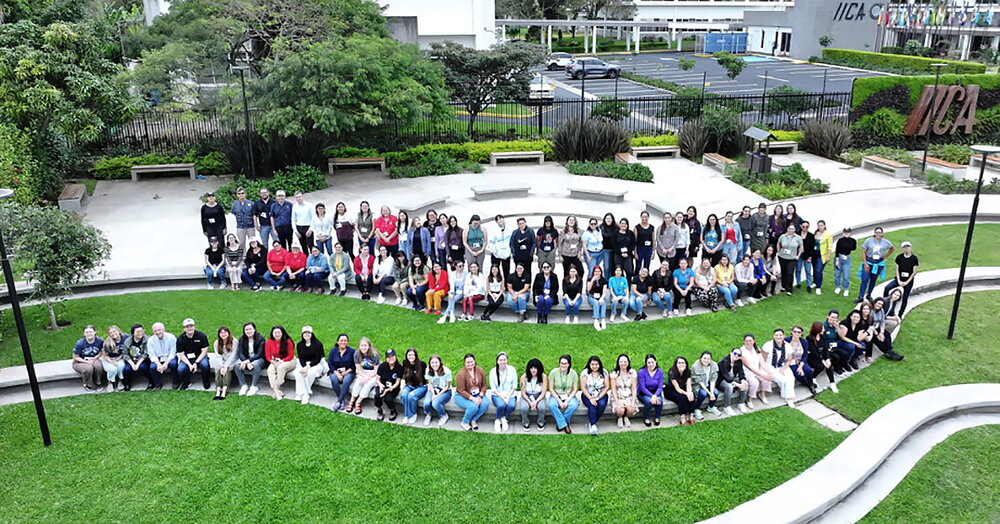
Training 100+ Women and Girls in GEO Technologies:
Over 100 women and girls with a passion for agriculture and natural resource management participated in a training workshop on GEO applications at a three-day event held at the Inter-American Institute for Cooperation on Agriculture (IICA) in San José, Costa Rica.

Participants and organizers at the GeoFem: Women in Geospatial Technologies workshop in San José, Costa Rica (credit: IICA/Jose García)
The GeoFem: Women in Geospatial Technologies workshop, also known as Rally Femenino, was organized by founder María José Molina from the Central American Aerospace Network (RAC), along with Jonathan Castro and Carolina Guzmán from IICA.
Since 2019, GeoFem has trained more than 500 women and girls in geospatial technologies. The latest workshop was held in partnership with several organizations, including SERVIR (a joint initiative of NASA and the U.S. Agency for International Development), NASA Harvest, Brigham Young University (BYU), the BYU Ballard Center for Social Impact, UNESCO, and AmeriGEO.
The GeoFem workshops aim to address disparities between men and women by building women’s geospatial skills and facilitating professional empowerment and leadership. The workshop supports women in applying these skills to address environmental challenges, particularly in rural areas.
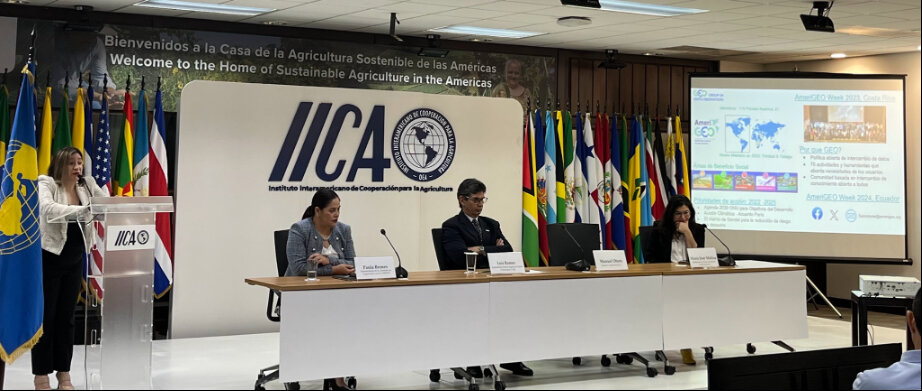
Betzy Hernández, SERVIR Regional Science Lead for Central America, gives an overview of AmeriGEO at the GeoFem opening event. (credit: SERVIR/Lena Pransky)
Integrating GEO’s Work Programmes for Climate Resiliency:
This year’s GeoFem workshop focused on two GEO Work Programme activities, GEOGLAM and GEOGloWS, both of which are regionally led by AmeriGEO. Collaborating partners recognized the capacity of these activities to support community resilience through improved agricultural, food security, and hydrological monitoring.
With the support of Dr. Jim Nelson from BYU, participants were introduced to GEO applications such as the GEOGloWS Global Streamflow Forecasting tool, a global hydrological model that generates forecasts that are updated on a daily basis, and Climate Trends, which enables users to examine variables such as precipitation and soil moisture.
Participants engaged in training on GEOGLAM-related tools for agricultural and food security monitoring, led by Antonio Sánchez from NASA Harvest. In these sessions, participants learned how to use GEOGLAM’s GEO Crop Monitor and AGMET tools, along with ClimateSERV and Google Earth Engine to conduct advanced analysis for decision-making in agriculture.
Creating a Space for Multigenerational Leadership:
IICA invited women and girls 14 years and older to attend the workshop, promoting leadership from both established professionals and youth leaders. The workshop engaged young student mentors, referred to as “Godmothers,” who supported participants as they explored ways of applying GEO tools within their communities.
Five students attended the training from Edunámica, an association that provides opportunities for talented youth. The young students thanked the GeoFem participants and organizers for welcoming them into the space:
“It often feels like our opinion as young people doesn't matter,” shared Ifer, one of the Edunámica students. “But you've encouraged us throughout the entire workshop.”
On the final day, participants collaborated in small groups to present project proposals for using GEO applications to address environmental issues in their communities. For example, one group proposed using GEOGloWS to improve community-led water and sewage management efforts in areas with frequent flooding. GeoFem organizers highlighted that these proposals are far from hypothetical, and that many participants go on to implement the ideas that they generate during the workshop. Several participants also noted that they plan to share what they learned in their local communities, expanding the transformative impact of this GEO training.
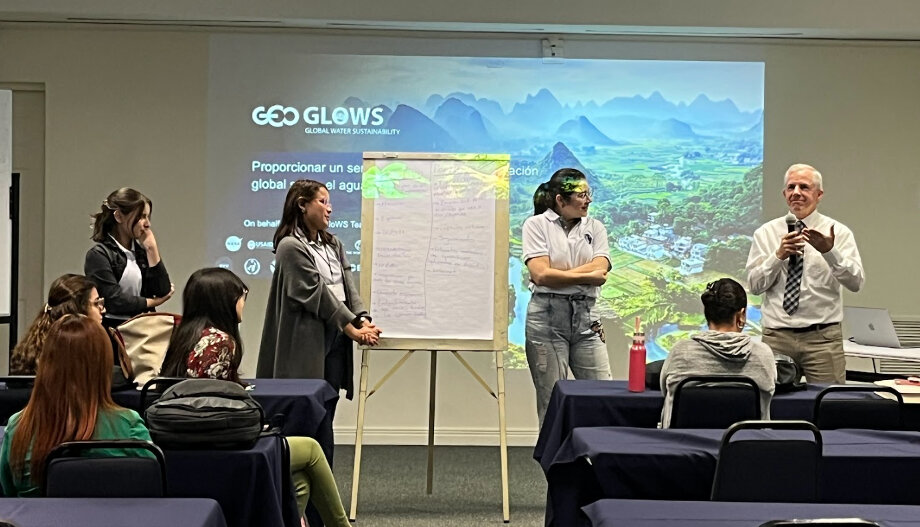
(R-L) Dr. Jim Nelson of BYU, GeoFem founder María José Molina, and Godmothers (youth mentors) Natalia Martínez and Emily Bolaños facilitate a GEOGloWS feedback session at the GeoFem workshop. (credit: IICA/Jose García)
Commitment to Regional GEO Training:
The GeoFem organizers hope to replicate this workshop across the region, recognizing that the workshop structure, along with training on GEO Work Programme activities like GEOGLAM and GEOGloWS, could be transferable to support women in other communities.
María José Molina, GeoFem founder and current president of RAC, has been instrumental in these efforts. Under Molina’s leadership, RAC actively participated at AmeriGEO Week 2023, partnering with SERVIR to lead a workshop on improved flood mapping. This workshop supported AmeriGEO’s focus on regional geospatial capacity strengthening and knowledge transfer to address climate issues.
“We should bring this type of event to women in rural areas, who for various reasons may not be able to access this type of education in spatial technologies,” Molina shared, highlighting the importance of empowering women within climate resilience efforts. “They, in their rural communities, can be part of the urgent solutions that the planet needs to face environmental changes.”
To read a full press release about the GeoFem workshop, click on the button below:
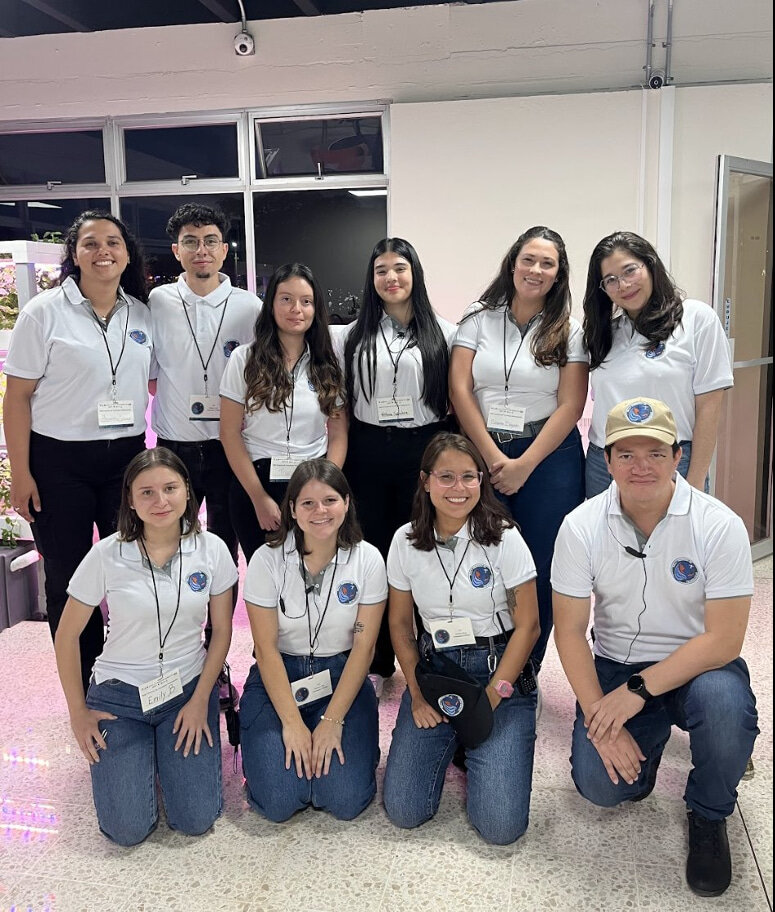
“Godmothers” served as student mentors for GeoFem participants, ensuring everyone felt comfortable using GEO tools to create proposals to address environmental issues in their communities. (Credit: SERVIR/Lena Pransky)
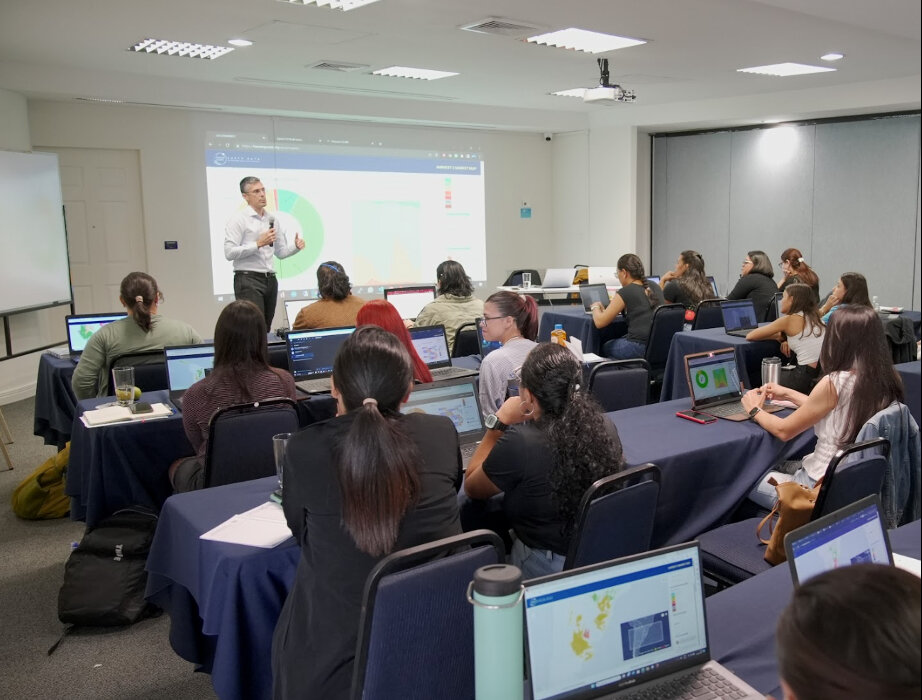
Antonio Sánchez from NASA Harvest introduces GEOGLAM at the GeoFem workshop. (Credit: SERVIR/Lena Pransky)
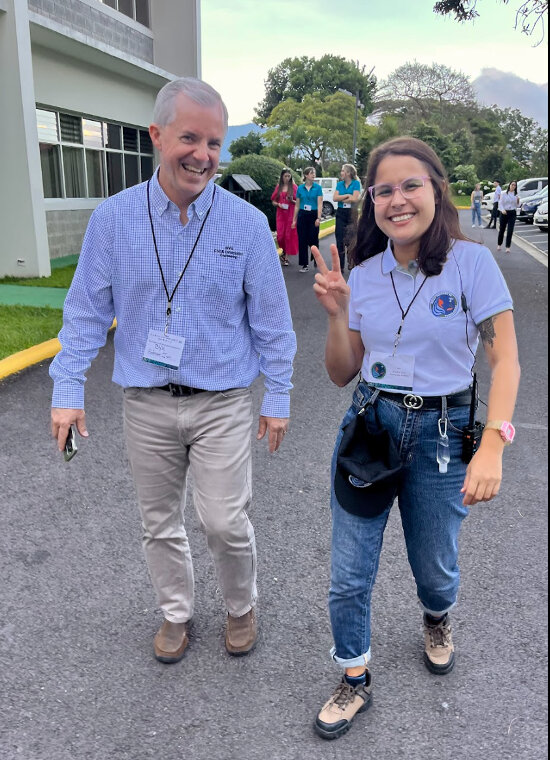
Dr. Jim Nelson of BYU at the GeoFem workshop with Godmother (youth mentor) Natalia Martínez. (Credit: SERVIR/Lena Pransky)